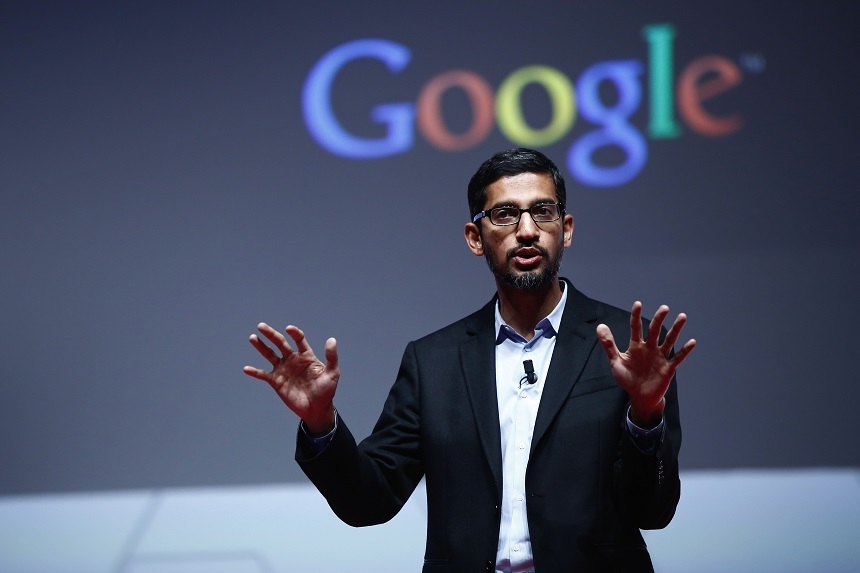
Sundar Pichai, senior vice president of Android, Chrome and Apps at Google Inc., speaks during a keynote session at the Mobile World Congress in Barcelona, Spain, on Monday, March 2, 2015. The event, which generates several hundred million euros in revenue for the city of Barcelona each year, also means the world for a week turns its attention back to Europe for the latest in technology, despite a lagging ecosystem. Photographer: Simon Dawson/Bloomberg via Getty Images
Google Chief Executive Officer Sundar Pichai has issued one of the strongest cautions yet about the state of the artificial intelligence (AI) market, warning that no company not even Google would escape the consequences if the current AI investment boom collapses into a bubble burst.
At Google’s headquarters in Mountain View, California, Pichai said that while the rapid growth of AI represents a transformational period in tech history, the pace and scale of investment have created undeniable signs of “irrationality” across the industry.
He noted that Silicon Valley is experiencing financial dynamics similar to the build-up to the dot-com crash of 2000, with valuations rising faster than real-world adoption. Yet, he emphasised that such cycles are typical in revolutionary moments.
“We can look back at the internet right now. There was clearly a lot of excess investment, but none of us today would question whether the internet was profound,” Pichai said. “I expect AI to be the same. So I think it’s both rational, and there are elements of irrationality through a moment like this.”
When asked explicitly whether Alphabet the world’s second-most valuable tech company could withstand a potential crash, Pichai replied bluntly, “I think no company is going to be immune, including us.”
His remarks come at a time when Alphabet’s own valuation has doubled in just seven months, hitting $3.5 trillion as investors bet heavily on Google’s advances in AI model development and its new specialised chips, which increasingly compete with Nvidia’s hugely dominant hardware.
Nvidia recently became the first company in history to hit a $5 trillion valuation, largely due to demand for its AI chips, deepening market fears of overheating.
Analysts have raised concerns about the enormous $1.4 trillion worth of layered deals surrounding OpenAI, even though the company’s expected revenue this year remains a tiny fraction of that amount.
Some financial experts warn that if OpenAI slows, misses revenue targets, or faces regulatory hurdles, the broader AI ecosystem could feel the impact immediately.
Pichai acknowledged these concerns indirectly, saying the sector must prepare for “overshoots” and corrections.
Despite the risks, Pichai argued that Alphabet is structurally better positioned to survive any turbulence due to its control of the entire AI stack spanning from data sources such as YouTube, to chips, to model training infrastructure, to frontier research labs.
“We own the full stack,” he said, calling it a competitive advantage that reduces dependency on external suppliers and gives Google more resilience than many AI-only startups burning through capital at unsustainable rates.
However, he stressed that even this advantage cannot fully shield any company from a market-wide correction.
Pichai also highlighted Alphabet’s deepening commitment to the UK, a country positioning itself as a global AI hub. Alphabet recently announced a £5bn investment into the UK’s AI ecosystem, with plans to expand infrastructure, research and a new phase of model training within British borders.
For the first time, Google will train some of its large models in the UK a move welcomed by ministers who want Britain to emerge as the world’s third-largest AI “superpower,” behind the US and China.
“We are committed to investing in the UK in a pretty significant way,” Pichai said, adding that the company views the country as a long-term strategic partner.
Pichai also raised alarm over the global energy burden created by AI expansion, pointing out that AI systems consumed 1.5% of the world’s electricity in 2024 a figure expected to balloon sharply as generative AI adoption grows.
“You don’t want to constrain an economy based on energy,” he warned, urging world governments to scale up power generation and grid infrastructure.
He admitted that Google’s own aggressive AI growth had created delays in meeting its climate and sustainability targets. Although Alphabet still pledges to reach net zero emissions by 2030, Pichai said the pace of progress had “been impacted.”
On the issue of employment, Pichai described AI as “the most profound technology” humanity has ever built, one that will transform all professions from teaching and medicine to law and media.
“It will evolve and transition certain jobs, and people will need to adapt,” he said. Those who learn to use AI tools “will do better,” he added, predicting that workers who fail to adapt could face economic disadvantages.
Pichai also suggested that entirely new classes of jobs would emerge, similar to how the internet created industries that did not exist in the 1990s.
The interview comes as scrutiny of the AI sector reaches an unprecedented level. Regulators in the US, Europe and Asia are examining everything from training data practices to market concentration, while investors debate whether the sector is experiencing a sustainable boom or a speculative bubble.
Pichai’s comments, analysts say, represent one of the clearest acknowledgements by a major tech leader that the AI market may be overheating.
Erizia Rubyjeana



